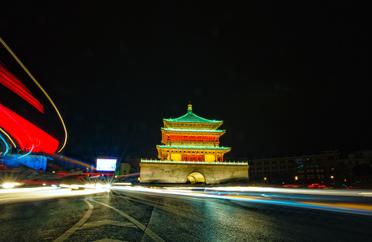China Tours
Walk the Great Wall, see the Terracotta Warriors, explore modern cities and taste incredible food.
Popular tours
- Save16%
 View Tour
View TourChina Highlights - 8 Days
- Shanghai to Beijing
- Age group: 15 - 99
- Max group size: 16
Was:£1,210From£1,018 - Save16%
 View Tour
View TourNorth China Getaway - 12 Days
- Beijing to Shanghai
- Age group: 15 - 99
- Max group size: 16
Was:£955From£804 - Save16%
 View Tour
View TourChina Express - 8 Days
- Beijing to Shanghai
- Age group: 12 - 100
- Max group size: 16
Was:£1,129From£950 - Save11%
 View Tour
View TourExplore China - 12 Days
- Shanghai to Beijing
- Age group: 15 - 99
- Max group size: 12
Was:£2,320From£2,067 - Save11%
 View Tour
View TourPremium China - 12 Days
- Shanghai to Beijing
- Age group: 15 - 99
- Max group size: 12
Was:£3,330From£2,967 - Save24%
 View Tour
View TourYin and Yangtze - 15 Days
- Beijing to Shanghai
- Age group: 15 - 99
- Max group size: 24
Was:£3,160From£2,411
China Tours
Welcome to the captivating world of China, a land of timeless beauty and awe-inspiring wonders. Embark on an unforgettable journey with our exclusive China tours and indulge in the rich tapestry of this magnificent country. From ancient treasures to modern marvels, China holidays offer an exquisite blend of history, culture, and natural splendor, making it a dream destination for discerning travelers.
Step into a realm where centuries-old traditions meet cutting-edge innovation, and be enthralled by the sheer diversity that China has to offer. Begin your adventure in the bustling metropolis of Beijing, where the iconic Great Wall snakes across majestic landscapes, standing as a testament to the ingenuity of the ancient Chinese civilization. Explore the splendid Forbidden City, once home to emperors, and immerse yourself in the imperial grandeur of its ornate palaces and tranquil gardens.
No trip to China would be complete without a visit to the mystical city of Xi'an, the cradle of Chinese civilization. Marvel at the Terracotta Army, an archaeological wonder that guards the tomb of the first emperor of China, and let the ancient warriors transport you back in time to a bygone era. Delve deeper into history as you wander through the narrow lanes of the enchanting city, savoring the tantalizing aromas of local street food and soaking in the vibrant atmosphere.
Venture south to the dazzling city of Shanghai, where modern skyscrapers pierce the sky and blend seamlessly with traditional Chinese architecture. Stroll along the iconic Bund promenade, gazing across the Huangpu River at the futuristic skyline that lights up the night. Lose yourself in the labyrinthine alleyways of the Old Town, where hidden treasures await at every turn, from quaint tea houses to tranquil gardens.
For nature enthusiasts, China's landscapes offer a breathtaking canvas of awe-inspiring beauty. Explore the ethereal beauty of the Li River in Guilin, where limestone karsts rise majestically from the emerald waters, creating a scene straight out of a painting. Traverse the magnificent Zhangjiajie National Forest Park, a UNESCO World Heritage site, and be spellbound by its towering sandstone pillars that inspired the mythical landscapes of the movie "Avatar."
Beyond its historical and natural wonders, China embraces a vibrant tapestry of cultures and traditions. Experience the charm of ancient water towns like Suzhou and Wuzhen, where picturesque canals wind through centuries-old stone bridges and traditional houses with elegant courtyards. Immerse yourself in the vibrant arts scene of Beijing, watching mesmerizing acrobatic performances and Peking Opera shows that showcase the country's rich cultural heritage.
In addition to its captivating attractions, China entices visitors with its culinary delights. Embark on a gastronomic journey and savor the bold flavors of regional cuisines, from the fiery spices of Sichuan to the delicate dumplings of Shanghai. Indulge in mouthwatering street food and navigate bustling markets where aromatic scents fill the air, tantalizing your taste buds.
A visit to China is an unparalleled adventure that will leave an indelible mark on your soul. Whether you are seeking ancient wonders, natural marvels, cultural treasures, or culinary delights, our China tours offer a gateway to a world of discovery. Let us craft a tailor-made holiday that will exceed your expectations and create memories to last a lifetime. Book your journey to China today and unlock the secrets of this captivating nation.
When is the best time to visit China?
The best time to visit China largely depends on the region you plan to explore and the experiences you seek. China is vast and diverse, encompassing various climate zones and landscapes. Here's a general guide to help you choose the optimal time for your visit:
Spring (April to May) and Autumn (September to October): These seasons are considered the best times to visit most parts of China. The weather is generally mild and pleasant, with blooming flowers in spring and vibrant foliage in autumn. It's an ideal time for exploring cities like Beijing, Shanghai, and Xi'an, as well as popular destinations like the Great Wall and the Terracotta Army.
Summer (June to August): Summer in China can be hot and humid, particularly in the southern and coastal regions. However, this is also the peak season for travel, as many tourists take advantage of school holidays. If you don't mind the crowds and heat, summer is a good time to visit destinations such as Guilin and Zhangjiajie, where you can enjoy the beauty of natural landscapes.
Winter (December to February): Winter in China can be chilly, especially in the northern regions. However, it can also be a great time to visit if you're interested in winter activities or want to experience the charm of Chinese New Year celebrations. Harbin, in northeastern China, hosts the renowned Ice and Snow Festival, where you can marvel at magnificent ice sculptures and participate in various winter sports.
It's important to note that China's climate varies significantly from region to region. Western China, including Tibet and Xinjiang, experiences colder temperatures and has distinct seasons. If you plan to visit these areas, consider the specific weather patterns and plan accordingly.
Ultimately, the best time to visit China depends on your personal preferences and the experiences you wish to have. Be sure to research the weather conditions of your desired destinations and take into account any festivals or events you'd like to witness.
Will I need a visa to travel to China?
A visa to visit China is required for most nationalities. Please check with your domestic government policy. The information below is updated regularly but may become out of date as Visa rules can change at any moment so please do check!
Important Update: Changes to the China Visa Application Process for UK Citizens
We wish to inform you of recent changes to the China visa application process for UK-based applicants, which may affect your clients' travel planning and timelines.
Summary of Key Changes:
1. Mandatory Online Pre-Approval Application
Applicants must now complete an online visa application, which is submitted to the authorities in Beijing for initial approval. This stage typically takes 2 to 3 weeks to process.
2. Issuance of Approval Document
If the application is approved, the applicant will receive an official approval document. In the event of a rejection, the applicant must restart the entire process, including the 2 to 3-week approval period.
3. In-Person Submission at Visa Centre
Following approval, applicants must personally submit their approval document and passport to the Chinese Visa Application Service Centre.
4. Visa Collection
Once submitted, the visa will be processed and ready for collection within 4 working days. The visa must be collected in person from the same service centre.
For Australian Citizes:
As of May 2025, Australian citizens can travel to China for tourism, business, family visits, or transit without a visa for stays of up to 30 days. This visa-free policy is in effect from November 30, 2024, to December 31, 2025 .
✅ Visa-Free Entry Requirements
To enter China under the visa-free arrangement, ensure the following:
Valid Australian Passport: Your passport must be valid for at least six months beyond your intended stay and have at least one blank visa page.
Purpose of Visit: Your trip must be for tourism, business, family visits, or transit.
Duration: Your stay must not exceed 30 days.
Proof of Onward Travel: Be prepared to show evidence of your return or onward journey.
Accommodation Details: Have information about your accommodation arrangements in China.
Chinese immigration authorities will assess your eligibility upon arrival. While prior notification to Chinese embassies or consulates is not required, it's advisable to carry documentation supporting your travel purpose and plans .cnto.org.au+1Smartraveller+1
🛂 When a Visa Is Required
You will need to apply for a visa if:
Extended Stay: You plan to stay in China for more than 30 days.
Other Purposes: Your visit involves activities not covered under the visa-free policy, such as employment or long-term study.
Multiple Entries: You require multiple entries beyond the visa-free allowance.au.china-embassy.gov.cn+9BTW Visas+9中国领事代理服务中心+9
In such cases, you can apply for a visa through the Chinese Visa Application Service Centers (CVASC) located in major Australian cities, including Sydney, Melbourne, Brisbane, Perth, Adelaide, and Canberra.
Tourist Visa (L Visa) Requirements for U.S. Citizens
U.S. citizens are required to obtain a tourist visa (L visa) before traveling to mainland China. This visa is not available on arrival and must be secured in advance.
Visa Validity and Duration
Validity: Tourist visas can be issued for up to 10 years, with multiple entries.
Duration of Stay: Each entry generally allows a stay of up to 60 days.
Required Documents
A valid U.S. passport with at least 6 months of remaining validity and two blank visa pages.
A completed visa application form, submitted online via the China Online Visa Application (COVA) system.
A passport-style photograph that meets consulate specifications.
Proof of U.S. residency, such as a driver’s license or utility bill.
Application Process
Complete the Online Application via the COVA system.
Schedule an appointment at the appropriate Chinese consulate or embassy.
Submit documents in person during the scheduled appointment.
Wait for processing, which typically takes several business days (expedited service is available at additional cost).
Visa Fees
The standard fee for a 10-year multiple-entry tourist visa is approximately $185.
Expedited services are available for an extra charge.
✈️ Visa-Free Transit Option
U.S. citizens may qualify for visa-free transit through certain Chinese cities when traveling to a third country.
Key Conditions:
Maximum stay: Up to 240 hours (10 days) in select regions.
Eligibility: Must be transiting from one country to another, via China (e.g., U.S. → China → Thailand).
Requirements:
Valid passport and confirmed onward ticket.
Must enter and exit via designated ports.
What are the must see destinations in China?
China is a vast and diverse country with countless remarkable destinations to explore. While it's challenging to narrow down the must-see places, here are some iconic and highly recommended destinations in China:
Beijing: As the capital city, Beijing offers a wealth of historical and cultural treasures. Don't miss the magnificent Great Wall, the Forbidden City with its imperial splendor, and the serene Temple of Heaven.
Shanghai: A vibrant metropolis, Shanghai showcases a blend of traditional and modern attractions. Visit the Bund for its iconic waterfront skyline, explore the historic Yu Garden, and wander through the trendy districts of Nanjing Road and Xintiandi.
Xi'an: Known for its ancient history, Xi'an is home to the world-famous Terracotta Army, an archaeological wonder that should not be missed. Take a stroll on the ancient city walls and visit the Giant Wild Goose Pagoda for a glimpse into China's rich past.
Guilin and Yangshuo: These scenic destinations are renowned for their breathtaking landscapes. Cruise along the Li River, surrounded by stunning limestone karsts, and explore the idyllic countryside of Yangshuo, with its picturesque villages and rice terraces.
Chengdu: Famous for its giant pandas, Chengdu offers the opportunity to visit the Chengdu Research Base of Giant Panda Breeding, where you can observe these adorable creatures up close. Explore the vibrant local culture and savor the city's famous spicy cuisine.
Zhangjiajie: This otherworldly national park served as the inspiration for the floating mountains in the movie "Avatar." Take a thrilling ride on the Bailong Elevator, wander through the enchanting Avatar Hallelujah Mountain, and traverse the glass-bottomed Zhangjiajie Grand Canyon Bridge.
Suzhou and Hangzhou: Known for their classic Chinese beauty, Suzhou and Hangzhou are famous for their elegant gardens, picturesque canals, and serene West Lake. Visit the Humble Administrator's Garden in Suzhou and enjoy a boat ride on West Lake in Hangzhou.
Lhasa: Located in Tibet, Lhasa is a city of spiritual significance. Explore the iconic Potala Palace, wander through the bustling Barkhor Street, and immerse yourself in the sacred atmosphere of Jokhang Temple.
These are just a few highlights, and China has so much more to offer. Whether you're fascinated by historical sites, natural wonders, or cultural experiences, China's diverse destinations will undoubtedly captivate and inspire you.
What is the local currency in China, and can I use credit cards?
The local currency in China is the Chinese Yuan (CNY), also referred to as Renminbi (RMB). When traveling in China, it is advisable to carry some cash in local currency for smaller establishments, street vendors, and places that may not accept credit cards.
Credit cards, particularly major international ones like Visa and Mastercard, are generally accepted in larger hotels, restaurants, and retail stores in major cities and tourist areas. However, it's important to note that acceptance may vary, especially in smaller towns or rural areas. Additionally, while credit cards are increasingly accepted, cash is still widely used in many establishments.
To ensure you have access to funds during your trip, it's recommended to carry a mix of cash and a credit card. You can exchange foreign currency for Chinese Yuan at airports, banks, or authorized currency exchange outlets. It's advisable to exchange currency at reputable places to ensure fair rates and avoid counterfeit bills.
It's also worth noting that some ATMs in China accept international debit and credit cards, allowing you to withdraw cash in local currency. However, it's essential to inform your bank or card issuer about your travel plans to avoid any issues with your card's usability abroad.
Traveler's checks are not widely accepted in China, so it's best to rely on cash and cards for your financial needs. Always keep your cash and cards secure, and consider splitting them between different locations or using a money belt for added safety.
Before traveling to China, it's recommended to check with your bank or card issuer regarding any international transaction fees, currency conversion rates, and to inform them of your travel plans to prevent any disruptions to your card usage.
Is China a good destination for solo travellers?
Yes, China can be a fantastic destination for solo travelers. With its rich history, diverse landscapes, and vibrant culture, China offers numerous opportunities for solo exploration and discovery.Here are some reasons why China is an excellent choice for solo travelers:
Safety: China is generally considered a safe country for travelers. The crime rates are relatively low, and locals are typically friendly and helpful towards visitors. As with any travel destination, it's important to take normal precautions, such as staying aware of your surroundings and safeguarding your belongings.
Ease of Transportation: China has a well-developed transportation infrastructure, including an extensive network of trains, domestic flights, and public transportation systems within cities. This makes it convenient for solo travelers to navigate and explore different regions of the country.
Rich Cultural Experiences: Solo travel allows you to immerse yourself fully in the local culture. From visiting ancient temples and historical sites to experiencing traditional festivals and indulging in local cuisines, China offers a wealth of cultural experiences that can be enjoyed at your own pace and tailored to your interests.
Language Considerations: While English is not widely spoken throughout China, especially in rural areas, major cities and popular tourist destinations often have English signage and some English-speaking locals. Learning a few basic Mandarin phrases can go a long way in facilitating communication and enhancing your solo travel experience.
Solo-Friendly Attractions: Many of China's iconic attractions are well-suited for solo exploration. Whether it's walking along the Great Wall, wandering through the winding streets of ancient neighborhoods, or taking a boat ride on picturesque lakes, you can relish these experiences independently, allowing for personal reflection and unhurried discovery.
Connect with Other Travelers: China attracts a significant number of travelers from around the world, which means you'll likely encounter fellow adventurers along the way. Hostels, travel forums, and social media groups can provide opportunities to connect with other travelers, join group tours, or find travel companions for specific activities or excursions.
As with any solo travel, it's advisable to research your destinations, plan your itinerary, and adhere to local customs and regulations. Respect the local culture, be mindful of local customs, and stay informed about any travel advisories or guidelines provided by your embassy or consulate.
By embracing the spirit of solo exploration and immersing yourself in China's captivating offerings, you can create unforgettable memories and embark on a truly transformative journey.
Is China a safe destination?
China is generally considered a safe destination for travelers. The country has a relatively low crime rate, and violent crimes targeting tourists are rare. However, as with any travel destination, it's important to take certain precautions to ensure your safety and well-being during your visit to China. Here are some safety tips to keep in mind:
Personal Belongings: Take care of your personal belongings, such as passports, wallets, and electronic devices. Keep them secure in a hotel safe or hidden on your person while exploring crowded areas. Be cautious of pickpockets in busy tourist areas or on public transportation.
Scams: Be aware of common scams that target tourists, such as overcharging for goods or services, fake products, or unauthorized tour guides. Do research in advance, book with reputable companies, and be cautious of unsolicited offers.
Health and Hygiene: Pay attention to food and water hygiene. Stick to bottled or boiled water, and be cautious with street food, ensuring it is freshly prepared and cooked. Carry necessary medications, use mosquito repellent if needed, and stay updated on any health advisories.
Traffic Safety: Exercise caution when crossing roads and be mindful of traffic rules. Pedestrians should use designated crosswalks, and it's recommended to follow local customs and observe how locals navigate traffic.
Cultural Sensitivity: Respect local customs, traditions, and cultural norms. Familiarize yourself with basic etiquette and dress appropriately, especially when visiting religious sites. Avoid sensitive topics and political discussions.
Language Barrier: English is not widely spoken outside major tourist areas, so consider learning a few basic Mandarin phrases or carrying a translation app to facilitate communication. Written addresses and key phrases can be useful when seeking assistance or directions.
Emergency Contacts: Familiarize yourself with emergency contact numbers in China, including those for the police (110) and medical emergencies (120). Keep important phone numbers and addresses written down or saved in your phone.
It's also advisable to stay informed about any travel advisories or guidelines issued by your embassy or consulate before and during your visit to China.
By exercising common sense, being aware of your surroundings, and respecting local customs, you can enhance your safety and have a rewarding and enjoyable experience exploring the wonders of China.
Will I require any vaccinations to travel to China?
Before traveling to China, it's essential to check the latest vaccination requirements and recommendations for your specific situation. While there are no mandatory vaccinations for entering China, certain vaccinations are generally recommended to ensure your health and well-being during your trip. Here are some common vaccinations to consider:
Routine Vaccinations: Ensure that you are up to date on routine vaccinations such as measles, mumps, rubella (MMR), diphtheria, pertussis, tetanus (DPT), and influenza.
Hepatitis A and B: Hepatitis A and B vaccines are recommended for most travelers to China, as these viruses can be contracted through contaminated food or water and close contact with infected individuals.
Typhoid: Typhoid is a bacterial infection that can be transmitted through contaminated food or water in certain areas of China. The typhoid vaccine is recommended, especially if you plan to visit rural areas or eat street food.
Japanese Encephalitis: This vaccine is recommended if you plan to spend a significant amount of time in rural agricultural areas or if your trip coincides with the peak transmission season (usually in summer and fall).
Rabies: If you anticipate activities that may bring you into close contact with animals, such as wildlife photography or volunteering with animals, the rabies vaccine may be recommended.
It's important to consult with a healthcare professional or travel medicine specialist well in advance of your trip to assess your individual health needs and receive personalized recommendations. They will consider factors such as your medical history, current health, the duration of your stay, and the specific regions you plan to visit.
Additionally, you should take general health precautions during your trip, such as practicing good hygiene, consuming safe food and water, and protecting yourself against mosquito bites in areas where mosquito-borne diseases are present.
Remember to carry your vaccination records with you while traveling and maintain travel insurance that covers any medical emergencies or evacuations.
Please note that the information provided here is general, and vaccination recommendations can change. It's always best to consult with a healthcare professional or refer to official sources such as the Centers for Disease Control and Prevention (CDC) or the World Health Organization (WHO) for the most up-to-date and accurate information regarding vaccinations and health guidelines for travel to China.
How does the rooming work on tours?
Small group tours in China typically involve a set itinerary where you travel with a group of fellow travellers and a tour leader/guide. Accommodation arrangements vary depending on the specific tour you choose. Here are some common aspects of rooming arrangements on small group tours:
Shared Rooms: In order to promote camaraderie and facilitate interaction among group members, most tours arrange shared accommodation. This means you will be paired with another member of the same gender from the group to share a room. Roommates may sometimes change periodically throughout the tour.
Single Supplement: If you prefer to have your own room and privacy, you may have the option to pay a single supplement fee. This additional fee allows you to have your own room for the duration of the tour. However, please note that single supplements can vary in cost and availability.
Roommate Matching: Tour operators usually offer roommate matching services, where they try to pair you with a suitable roommate based on your preferences, such as age range. This can help ensure compatibility and a more enjoyable experience for all participants.
Rooming Preferences: When booking your small group tour, it's important to communicate your rooming preferences to the tour operator. If you have specific requirements or preferences, such as sharing with a friend or a specific roommate request, it's advisable to inform the tour operator during the booking process.
It's important to carefully read the tour details and inclusions provided by the tour operator to understand their specific rooming policies. If having your own room is a priority, make sure to inquire about the availability of single supplements and any associated costs before booking your tour.
Keep in mind that while sharing a room with a fellow traveller can be a great way to meet new people and build connections, having your own room provides more privacy and flexibility. Consider your preferences and the dynamics of the tour when deciding whether to opt for a shared room or pay for a single supplement.
Remember to communicate your needs and preferences clearly with the tour operator during the booking process to ensure a comfortable and enjoyable accommodation experience on your small group tour in China.
What is the food like in China?
Chinese cuisine is renowned for its diversity, flavors, and regional specialties. It is a culinary treasure trove that offers a wide range of tastes, ingredients, and cooking styles. Here are some key features and popular dishes you can expect to encounter when exploring the food in China:
Regional Cuisine: China's vast size and diverse regions give rise to distinct regional cuisines. Some well-known styles include Cantonese cuisine (from Guangdong province), Sichuan cuisine (known for its spicy flavors), Shanghainese cuisine (with emphasis on seafood and delicate flavors), and Beijing cuisine (notable for its imperial influences).
Staple Foods: Rice and noodles are staple foods in China. Rice is commonly consumed in southern regions, while noodles take center stage in the north. You'll find a variety of rice and noodle dishes, such as fried rice, steamed rice, lo mein, chow mein, and dumplings.
Dim Sum: Dim sum is a popular Cantonese style of cuisine that consists of bite-sized portions of food, often served in bamboo steamers. Dim sum dishes include dumplings, steamed buns, rice rolls, and various savory and sweet treats. Dim sum is typically enjoyed during brunch or lunch.
Stir-Frying and Sichuan Peppercorns: Stir-frying is a prevalent cooking technique in Chinese cuisine, allowing for quick cooking and preservation of flavors and textures. Sichuan cuisine is known for its bold and spicy flavors, often incorporating Sichuan peppercorns, which give a unique numbing sensation to dishes.
Peking Duck: Peking Duck is a world-famous dish originating from Beijing. It features tender roasted duck with crispy skin, often served with thin pancakes, scallions, cucumber, and hoisin sauce. The art of carving and serving Peking Duck is a culinary spectacle.
Hot Pot: Hot pot is a communal dining experience where a simmering pot of broth is placed at the center of the table, and diners cook a variety of ingredients, such as thinly sliced meats, vegetables, tofu, and noodles, in the broth. Each person can customize their dipping sauces for added flavor.
Street Food: China is renowned for its vibrant street food scene. From steamed buns and skewered meats to jianbing (a savory pancake) and stinky tofu, you'll find a wide array of delicious street food options to tantalize your taste buds.
Tea Culture: China has a rich tea culture, and tea is an integral part of Chinese cuisine. From delicate green teas like Longjing to aromatic Oolong teas and robust black teas, tea is often served during meals and is believed to aid digestion.
These are just a few highlights of Chinese cuisine. As you explore different regions in China, you'll discover an array of unique dishes, flavors, and culinary traditions that reflect the country's rich history and diverse cultural heritage.
Can I drink the tap water in China?
It is generally not recommended to drink tap water in China. The quality of tap water can vary across different regions, and it's safer to err on the side of caution to avoid potential health issues.
Instead, it is advisable to drink bottled water or water that has been properly treated. Bottled water is widely available in convenience stores, supermarkets, and hotels throughout China. Look for sealed bottles from reputable brands and check the expiration date before purchasing.
If you are in a situation where bottled water is not readily available, you can consider boiling tap water before consumption. Boiling water can help kill bacteria and other harmful microorganisms. After boiling, allow the water to cool before drinking.
Additionally, be mindful of using tap water when brushing your teeth. It's recommended to use bottled or properly treated water for this purpose as well.
In some cities and high-end establishments, you may find filtered or purified tap water that is safe for drinking. If you're unsure about the water quality, it's best to ask the hotel staff or locals for guidance.
It's important to prioritize your health and take precautions to ensure safe drinking water during your stay in China. By sticking to bottled water or treated water, you can minimize the risk of waterborne illnesses and enjoy a healthy and worry-free trip.
Are there any cultural norms in China I should follow?
Yes, when visiting China, it's important to be aware of and respect the local cultural norms and customs. Here are some key cultural considerations to keep in mind:Greetings and Politeness: When meeting someone for the first time or in a formal setting, it is customary to greet with a handshake. However, in more casual situations, a nod or slight bow can be sufficient. Addressing people with their formal titles (e.g., Mr., Mrs., or professional titles) is also appreciated. Use "Nǐ hǎo" (pronounced nee-haow) for "hello" and "Xièxiè" (pronounced syeh-syeh) for "thank you."
Personal Space: Chinese culture places importance on personal space and modesty. It's advisable to maintain a respectable distance when interacting with others, especially in formal or professional settings. Public displays of affection, such as hugging or kissing, are generally considered inappropriate.
Dining Etiquette: When dining with others, wait for the host or eldest person to start eating before you begin. It's polite to try a bit of every dish and not finish all the food on your plate, as it may imply that you're still hungry. Use chopsticks properly and avoid sticking them upright in a bowl of rice, as it resembles a funeral ritual. Additionally, it's customary to offer a toast with the phrase "Gānbēi" (pronounced gan-bay) before taking a drink.
Respect for Elders and Authority: Chinese culture places a strong emphasis on respect for elders and authority figures. It's polite to address older individuals with appropriate honorifics and show deference to seniority in social and professional settings.
Gift Giving: Gift giving is a common practice in China. If you are invited to someone's home or attending a business meeting, it's considered thoughtful to bring a small gift. Avoid gifts that are overly expensive, as it may create a sense of indebtedness. When presenting a gift, use both hands, and expect the recipient to initially refuse it as a form of politeness. It's customary to persist gently until they accept.
Temple and Sacred Sites: When visiting temples or other sacred sites, dress modestly and respectfully. Cover your shoulders and knees, remove your hat, and follow any specific rules or rituals observed at the site. Maintain a quiet and peaceful demeanor to show reverence.
Photography: Always ask for permission before taking photos of people, especially when photographing individuals in traditional attire or religious settings. Some tourist sites may have restrictions on photography, so be mindful of any posted guidelines.
Tipping: Tipping is not a common practice in China, especially in local establishments. However, in high-end hotels or international restaurants, a service charge may be included. It's not expected to tip taxi drivers, but rounding up the fare is appreciated.
By being aware of and respecting these cultural norms, you can create positive interactions, foster goodwill, and show appreciation for the local customs and traditions in China.
What should I pack for a trip to China?
When packing for a trip to China, it's important to consider the season, the regions you'll be visiting, and the activities you plan to engage in. Here are some essential items to pack for your trip:
Clothing: Pack clothing appropriate for the season and the regions you'll be visiting. China experiences diverse climates, so it's important to check the weather forecast for your specific destinations. Bring comfortable walking shoes for exploring, as you'll likely be doing a lot of sightseeing. Also, consider packing modest clothing for visiting religious sites and dressing slightly more formal for business or formal occasions.
Travel Documents: Carry a valid passport with at least six months of validity remaining. Make copies of important travel documents such as your passport, visa, and travel insurance. Keep a digital copy stored in your email or cloud storage as a backup. If you plan to rent a car or drive in China, an International Driving Permit (IDP) may be required.
Visa and Documentation: Check the visa requirements for your nationality before traveling to China. Depending on your citizenship, you may need to apply for a visa in advance. Ensure you have all the necessary documentation, including your visa, before departing for China.
Medications and First Aid Kit: Bring any necessary prescription medications, along with a small first aid kit containing essentials like band-aids, antiseptic cream, pain relievers, and any specific medications you may require.
Power Adapter: China uses Type A, Type C, and Type I electrical outlets. Make sure to pack a universal power adapter to charge your electronic devices.
Language and Navigation Aids: Consider carrying a Mandarin phrasebook or language translation app to help with communication. Additionally, have a map or navigation app on your phone for getting around in China's cities.
Money and Banking: Carry sufficient local currency (Chinese Yuan - CNY) for your initial needs, such as transportation and small purchases. Inform your bank or credit card company about your travel plans to prevent any issues with using your cards abroad. ATMs are readily available in major cities for cash withdrawal.
Travel Insurance: It's highly recommended to have travel insurance that covers medical emergencies, trip cancellation, and other unforeseen events. Ensure that your insurance policy is valid for China and provides the necessary coverage for your trip.
Miscellaneous: Pack essentials such as a lightweight daypack, reusable water bottle, sunscreen, insect repellent, a travel-sized umbrella, and toiletries that may be difficult to find or are preferred by you.
Remember to pack according to the season and activities you plan to engage in. Layers are useful for adapting to varying temperatures, especially during transitional seasons. Consider researching the specific regions you'll be visiting to understand any additional items you may need based on local conditions and cultural norms.
Lastly, it's always a good idea to pack light and leave some space in your luggage for souvenirs or items you may acquire during your trip.
Is China a good family holiday destination?
Yes, China can be a fantastic destination for a family holiday. With its rich history, diverse culture, and a wide range of attractions and activities, there is something for everyone to enjoy. Here are some reasons why China can be an excellent choice for a family vacation:
Cultural Learning Opportunities: China's ancient history and vibrant culture provide numerous educational opportunities for children and adults alike. Visiting iconic landmarks such as the Great Wall of China, the Forbidden City, or the Terracotta Warriors can be a fascinating and enriching experience. Exploring traditional Chinese architecture, participating in calligraphy or painting classes, and experiencing local customs and traditions can broaden your family's cultural horizons.
Family-Friendly Attractions: China offers a wide array of family-friendly attractions and entertainment options. Theme parks like Shanghai Disneyland and Chimelong Ocean Kingdom in Guangzhou provide thrilling rides and entertainment suitable for all ages. Children will also enjoy exploring modern cities with futuristic skyscrapers, interactive museums, and aquariums.
Natural Beauty and Outdoor Activities: China boasts stunning landscapes and natural wonders that can captivate the entire family. From the picturesque karst mountains in Guilin to the breathtaking beauty of the Li River, there are plenty of opportunities for outdoor adventures. Families can go hiking, biking, or even take a cruise along the Yangtze River or the Li River, immersing themselves in the country's natural splendor.
Culinary Exploration: Chinese cuisine offers a wide variety of flavors and dishes that can appeal to different palates. Exploring local food markets, trying street food delicacies, and even participating in cooking classes can be a fun and interactive way to experience China's culinary traditions as a family.
Safe and Family-Oriented Environment: China is generally considered a safe destination for travelers, including families. The locals are often welcoming and accommodating, and many tourist areas have facilities and services catering to families. The country's efficient transportation system and modern infrastructure make it relatively easy to navigate with children.
Cultural Shows and Performances: Enjoying traditional Chinese performances such as acrobatics, Peking Opera, or the famous Chinese circus can be entertaining and memorable experiences for the whole family.
It's important to plan your family trip to China carefully, considering the ages and interests of your children. Research family-friendly accommodations, seek out activities and attractions suitable for children, and ensure you have necessary amenities and facilities available during your stay.
By creating an itinerary that balances educational experiences, exciting activities, and quality family time, you can make your trip to China a memorable and enjoyable experience for the entire family.


Book With Confidence
Monthly Payments
Spread the costs with no interest or additional fees
Best Price Guarantee
We won't be beaten on price. If you find this adventure at a lower price please get in touch!
Reserve now & pay later
Reserve your adventure today and pay later, free of charge
ATOL protected
Book with confidence
Hold your space today, for free
or book your trip with a deposit and then pay the rest in instalments.
Reserve your flights with us
Add flights to your booking and we'll take care of the rest. You'll get 24/7 support from our team & ATOL protection.
Speak to our experts
Call or email our expert team to find out more and help with ideas and planning.









